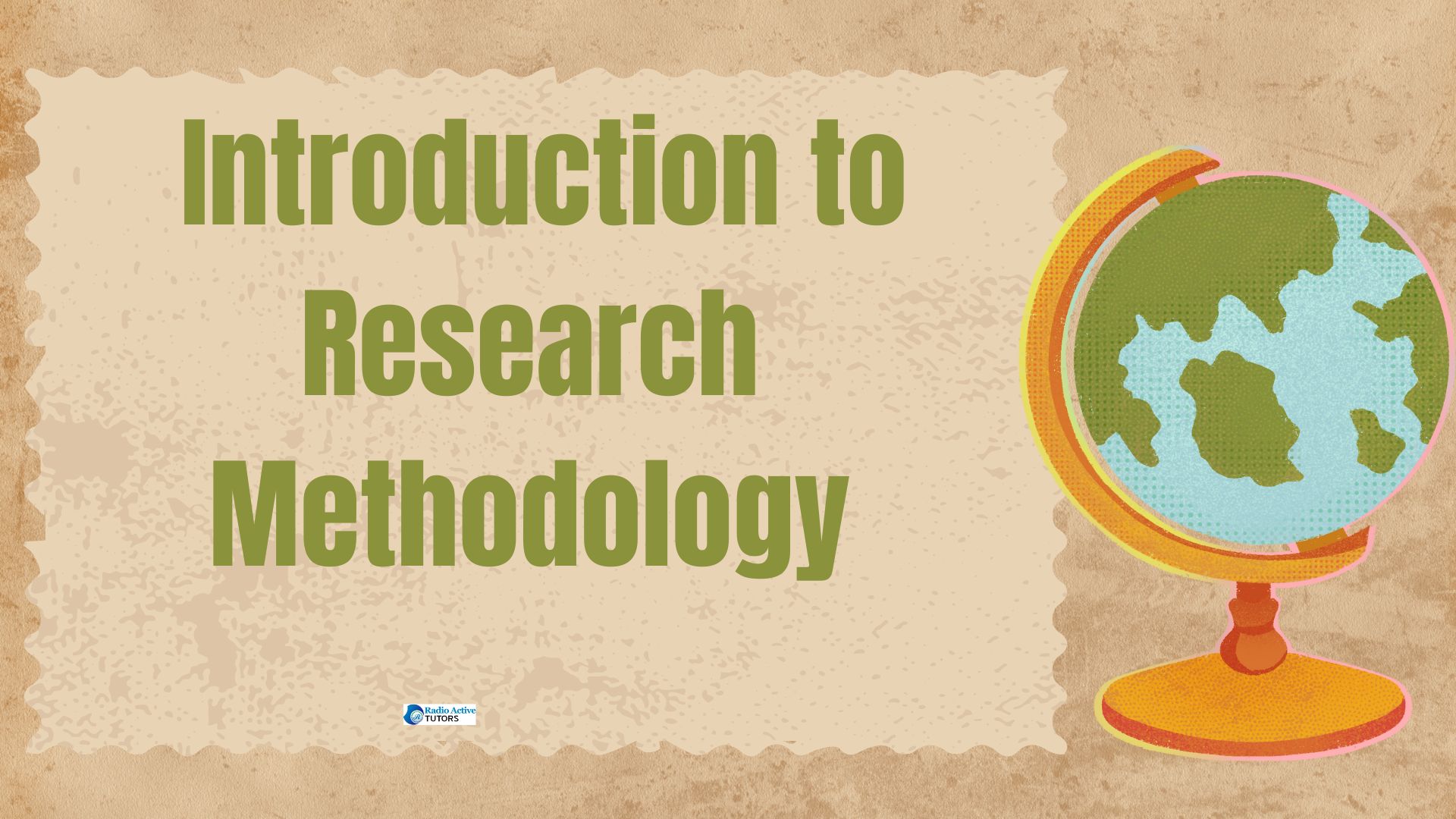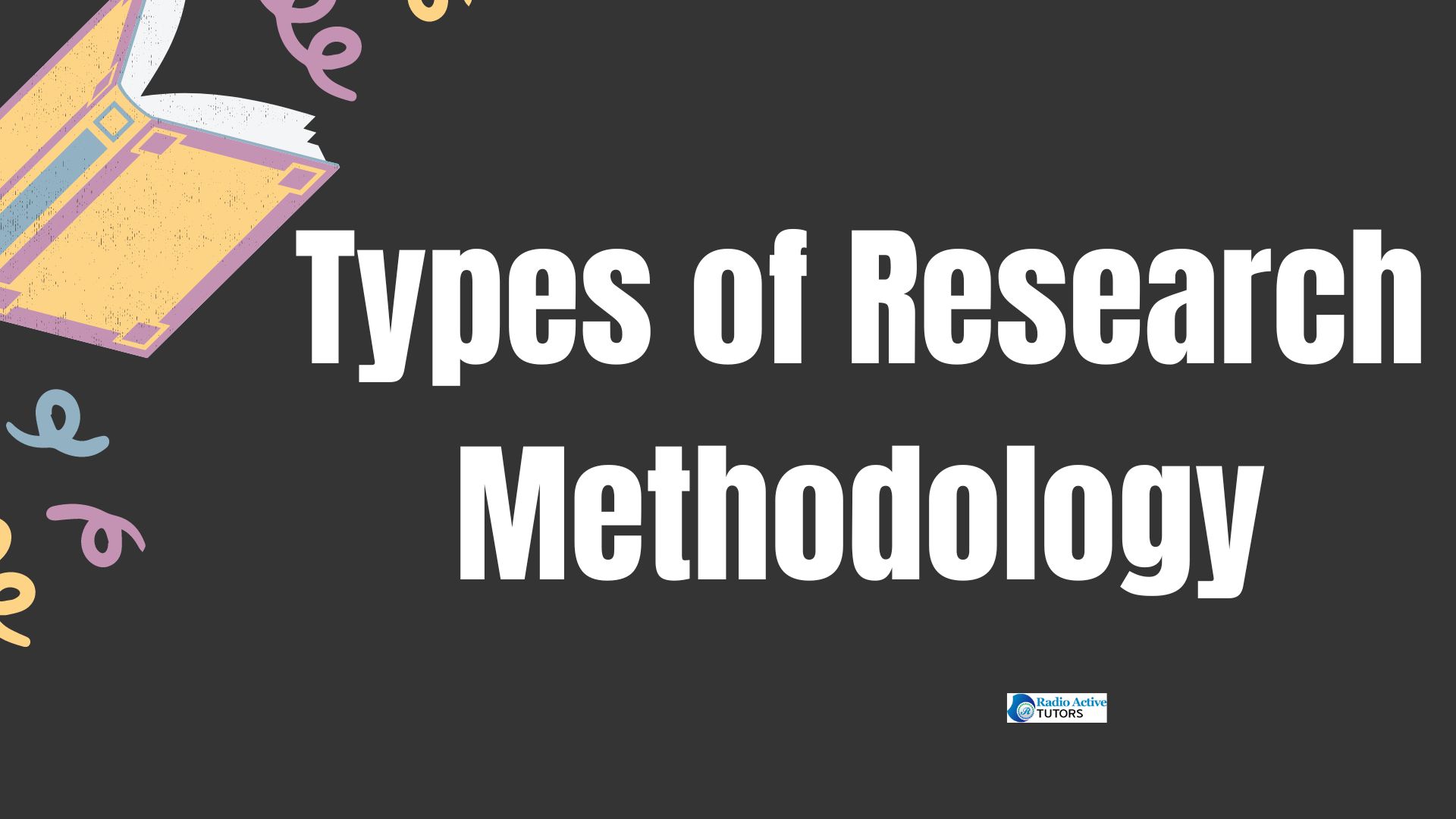Table of Contents
I. Introduction to Research Methodology
II. Understanding the Basics of Research Methodology
III. Types of Research Methodology
IV. Choosing the Right Research Methodology
V. Frequently Asked Questions (FAQs)
I. Introduction to Research Methodology

A. Defining Research Methodology
In the realm of academic and scientific inquiry, defining research methodology is fundamental to the rigorous pursuit of knowledge. Research methodology encompasses the systematic framework and procedures employed by researchers to investigate, analyze, and interpret phenomena of interest. It serves as the blueprint for conducting research, guiding researchers in the selection of appropriate methods, data collection techniques, and analytical tools.
Essentially, research methodology delineates the path that researchers follow to address their research questions or hypotheses effectively. It involves critical decisions regarding the research design, sampling strategies, data collection instruments, and data analysis techniques, all aimed at ensuring the validity, reliability, and generalizability of research findings. Thus, a clear and well-defined research methodology is paramount for ensuring the integrity and credibility of research endeavors across diverse disciplines.
B. Importance of Understanding Research Methodology
Understanding research methodology is paramount in the field of academic and scientific inquiry as it serves as the cornerstone of the research process. A comprehensive grasp of research methodology empowers researchers to navigate the complexities of designing, conducting, and interpreting research studies effectively. It enables researchers to make informed decisions regarding the selection of appropriate research designs, methods, and techniques tailored to their specific research questions or objectives.
Furthermore, a profound understanding of research methodology facilitates critical thinking and evaluation of existing literature and research findings, allowing researchers to discern the strengths, limitations, and potential biases inherent in different research approaches. Ultimately, by comprehending research methodology, researchers can enhance the rigor, validity, and reliability of their research endeavors, thereby advancing knowledge and contributing to the growth and evolution of their respective fields.
II. Understanding the Basics of Research Methodology
A. Definition and Scope
In the foundational understanding of research methodology, the concepts of definition and scope play pivotal roles in delineating the boundaries and parameters of research endeavors. Definition refers to the precise articulation of the key terms, concepts, and phenomena under investigation, providing clarity and direction to the research process. It involves crafting concise and operational definitions that guide researchers in framing their research questions and hypotheses effectively. On the other hand, scope defines the extent and breadth of the research inquiry, specifying the range of topics, variables, and contexts encompassed within the study.
Understanding both definition and scope is essential for researchers to establish a solid foundation for their research endeavors, ensuring alignment between research objectives, methodology, and outcomes. Moreover, clarity in defining the scope of research helps researchers identify the appropriate research designs, methods, and data collection techniques best suited to address their research questions or objectives comprehensively. Overall, a nuanced comprehension of definition and scope lays the groundwork for robust and impactful research methodology.
B. Key Components of Research Methodology

1. Research Design
Research design stands as a central pillar within the framework of research methodology, encompassing the blueprint that dictates the overall structure and approach of a research study. It serves as the roadmap guiding researchers in systematically addressing their research questions or hypotheses and achieving their intended objectives. Research design entails critical decisions regarding the selection of appropriate research methods, sampling techniques, data collection procedures, and data analysis strategies. It lays the groundwork for the systematic collection, analysis, and interpretation of data, ensuring the validity, reliability, and generalizability of research findings.
A well-crafted research design is characterized by its alignment with the research objectives, feasibility within the constraints of time, resources, and ethical considerations, and the ability to generate meaningful insights and contribute to the advancement of knowledge within the respective field of study. Thus, a thorough understanding of research design is indispensable for researchers aiming to conduct rigorous and impactful research studies.
2. Data Collection Methods
Data collection methods constitute a crucial element within the framework of research methodology, serving as the means through which researchers gather empirical evidence to address their research questions or hypotheses. These methods encompass a diverse array of techniques tailored to the specific objectives, context, and nature of the research study. Common data collection methods include surveys, interviews, observations, experiments, and document analysis, each offering unique strengths and limitations in terms of data validity, reliability, and applicability.
The selection of appropriate data collection methods hinges on various factors, including the research design, research questions, target population, available resources, and ethical considerations. Moreover, researchers must meticulously plan and execute data collection procedures to ensure the quality and integrity of the data collected. A comprehensive understanding of different data collection methods empowers researchers to make informed decisions, optimize data collection processes, and derive meaningful insights that contribute to the advancement of knowledge within their respective fields of study.
3. Data Analysis Techniques
Data analysis techniques constitute a vital component within the framework of research methodology, representing the systematic processes through which researchers transform raw data into meaningful insights and conclusions. These techniques encompass a diverse array of quantitative and qualitative methods, each tailored to the nature of the research data and the research objectives. Quantitative data analysis techniques include statistical methods such as descriptive statistics, inferential statistics, regression analysis, and factor analysis, which enable researchers to quantify relationships, patterns, and trends within the data.
Qualitative data analysis techniques, on the other hand, involve systematic approaches such as thematic analysis, content analysis, and grounded theory, aimed at uncovering themes, patterns, and meanings embedded within textual or narrative data. The selection of appropriate data analysis techniques depends on various factors, including the research design, data type, research questions, and theoretical framework. Moreover, researchers must employ rigorous and transparent data analysis procedures to ensure the validity, reliability, and trustworthiness of their findings. A nuanced understanding of different data analysis techniques equips researchers with the tools and insights necessary to derive meaningful interpretations and draw robust conclusions from their research data, thereby advancing knowledge within their respective fields of study.
4. Ethical Considerations
Ethical considerations represent a fundamental pillar within the framework of research methodology, guiding researchers in conducting their studies with integrity, respect, and responsibility towards participants and society at large. These considerations encompass a range of principles and guidelines aimed at safeguarding the rights, welfare, and dignity of research participants, ensuring the transparency, honesty, and fairness of research practices, and minimizing potential risks and harm associated with the research process. Key ethical principles in research include respect for autonomy, beneficence, nonmaleficence, and justice, which underpin the informed consent process, confidentiality and privacy protections, voluntary participation, and fair treatment of participants.
Moreover, researchers must adhere to ethical standards established by regulatory bodies, institutional review boards, and professional associations, ensuring compliance with legal and ethical guidelines governing research conduct. By upholding ethical considerations in research methodology, researchers can foster trust, credibility, and accountability in their research endeavors, thereby contributing to the advancement of knowledge and the well-being of individuals and communities.
III. Types of Research Methodology

A. Quantitative Research Methodology
Quantitative research methodology is a systematic approach used to collect, analyze, and interpret numerical data to understand phenomena, relationships, and patterns within a specific research context. This type of methodology relies on structured data collection instruments, such as surveys, questionnaires, or experiments, to gather quantitative data that can be analyzed using statistical techniques. Quantitative research aims to quantify variables and establish causal relationships between them, employing methods such as descriptive statistics, inferential statistics, and regression analysis to test hypotheses and draw conclusions based on numerical evidence.
This methodology is characterized by its emphasis on objectivity, replicability, and generalizability, as well as its ability to provide precise and reliable insights into the research subject. Quantitative research is commonly used in disciplines such as psychology, economics, and sociology to investigate phenomena that can be measured and analyzed quantitatively, offering valuable insights for decision-making, policy development, and theory testing.
1. Characteristics and Purpose
Quantitative research methodology is distinguished by its focus on numerical data and statistical analysis to uncover patterns, relationships, and trends within a given research context. The primary purpose of quantitative research is to quantify variables, test hypotheses, and establish cause-and-effect relationships between variables through systematic data collection and analysis. This methodology relies on structured data collection instruments, such as surveys, questionnaires, or experiments, to gather empirical evidence that can be objectively measured and analyzed using statistical techniques. Characteristics of quantitative research include its emphasis on objectivity, reliability, and replicability, as well as its ability to generate precise and generalizable findings.
Quantitative research is commonly employed in disciplines such as psychology, economics, and education, where numerical data is used to inform decision-making, policy development, and theory testing. Overall, the characteristics and purpose of quantitative research methodology align with its goal of providing rigorous and systematic approaches to investigating research questions and generating evidence-based insights.
2. Methods: Surveys, Experiments, Observational Studies
In quantitative research methodology, various methods are employed to collect empirical data and analyze numerical information. Surveys, experiments, and observational studies are among the most common techniques utilized to gather quantitative data and investigate relationships between variables. Surveys involve the systematic collection of information from a sample of participants using structured questionnaires or interviews, allowing researchers to gather data on attitudes, behaviors, and preferences.
Experiments, on the other hand, involve manipulating independent variables to observe their effects on dependent variables under controlled conditions, enabling researchers to establish cause-and-effect relationships. Observational studies entail the systematic observation and recording of behavior or phenomena in naturalistic settings, providing insights into patterns and relationships without intervention. Each method has its strengths and limitations, and the choice of method depends on the research objectives, the nature of the research questions, and practical considerations such as resources and ethical considerations. Overall, surveys, experiments, and observational studies are integral components of quantitative research methodology, offering researchers versatile tools to explore and understand phenomena in diverse fields of study.
B. Qualitative Research Methodology
Qualitative research methodology is a comprehensive approach used to explore and understand complex phenomena, experiences, and meanings within specific contexts. Unlike quantitative research, which focuses on numerical data and statistical analysis, qualitative research emphasizes depth, richness, and contextuality, seeking to uncover subjective interpretations and subjective experiences. This methodology relies on flexible and iterative processes of data collection and analysis, often involving techniques such as interviews, focus groups, observations, and textual analysis to gather in-depth insights into the perspectives, beliefs, and behaviors of participants.
Qualitative research aims to generate holistic and nuanced understandings of social phenomena, cultural practices, and human experiences, highlighting the importance of context, reflexivity, and interpretation in the research process. This approach is commonly used in disciplines such as anthropology, sociology, and education, where the exploration of meanings and interpretations is central to the research inquiry. Overall, qualitative research methodology offers a valuable framework for exploring complex phenomena and generating rich, contextually embedded insights that contribute to a deeper understanding of the social world.
1. Characteristics and Purpose
Qualitative research methodology is characterized by its emphasis on exploring subjective meanings, experiences, and contexts within a specific research setting. Unlike quantitative research, which focuses on numerical data and statistical analysis, qualitative research prioritizes depth, richness, and complexity in understanding phenomena. The purpose of qualitative research is to generate in-depth insights, explore diverse perspectives, and uncover underlying meanings and patterns inherent in human behavior and social interactions.
This methodology relies on flexible and iterative approaches to data collection and analysis, often involving techniques such as interviews, observations, and textual analysis to capture the nuances and complexities of the research subject. Qualitative research aims to provide a holistic understanding of social phenomena, cultural practices, and individual experiences, emphasizing the importance of context, interpretation, and reflexivity in the research process. Overall, the characteristics and purpose of qualitative research methodology align with its goal of exploring and interpreting the multifaceted aspects of human life and social reality.
2. Methods: Interviews, Focus Groups, Case Studies

In qualitative research methodology, a variety of methods are employed to gather rich and detailed data that capture the complexity of human experiences and social phenomena. Three commonly used methods include interviews, focus groups, and case studies. Interviews involve in-depth conversations between researchers and participants, allowing for the exploration of individual perspectives, beliefs, and experiences. Focus groups bring together a small group of participants to engage in facilitated discussions on a specific topic, enabling researchers to explore shared understandings, group dynamics, and collective meanings.
Case studies involve intensive, detailed examinations of a single individual, group, organization, or community, providing rich insights into particular contexts, processes, and phenomena. Each method offers unique strengths in capturing the depth and complexity of qualitative data and allows researchers to explore diverse perspectives, contexts, and dimensions of the research subject. By employing a combination of these methods, qualitative researchers can generate comprehensive and nuanced understandings of social phenomena and human experiences within their respective research contexts.
IV. Choosing the Right Research Methodology
A. Factors Influencing Methodology Selection
Choosing the appropriate research methodology is a critical decision that researchers must make, and several factors influence this selection process. One significant factor is the nature of the research question or problem being investigated. Different research questions may require different approaches, such as quantitative methods for testing hypotheses or qualitative methods for exploring complex phenomena. The characteristics of the research population or sample also play a crucial role in methodology selection, as certain methods may be more suitable for specific groups or contexts.
Additionally, practical considerations such as available resources, time constraints, and access to participants or data sources can impact the choice of methodology. Moreover, researchers must consider ethical considerations, disciplinary conventions, and the intended audience when determining the most appropriate methodology for their study. By carefully evaluating these factors and their implications, researchers can choose the methodology that best aligns with their research goals, objectives, and constraints, ensuring the validity, reliability, and relevance of their findings.
1. Research Objectives
Research objectives play a pivotal role in influencing the selection of the appropriate methodology for a study. The clarity and specificity of research objectives determine the type of data needed, the level of depth required in analysis, and the overall approach to addressing research questions. For instance, if the research aims to quantify relationships between variables or test hypotheses, a quantitative methodology may be more suitable. On the other hand, if the goal is to explore complex phenomena, understand subjective experiences, or uncover underlying meanings, a qualitative methodology would be more appropriate.
Additionally, the research objectives guide decisions regarding the scope of the study, the selection of participants or cases, and the choice of data collection and analysis techniques. By aligning the chosen methodology with the research objectives, researchers ensure that their study addresses the intended research questions effectively and generates relevant and meaningful insights within the specified context.
2. Nature of the Research Problem
The nature of the research problem is a crucial factor that significantly influences the selection of the appropriate methodology. Different types of research problems require different approaches for investigation, which in turn dictate the choice of methodology. For instance, if the research problem is focused on exploring subjective experiences, understanding social dynamics, or uncovering complex phenomena, a qualitative methodology may be more suitable. On the other hand, if the research problem involves testing hypotheses, quantifying relationships between variables, or generalizing findings to a larger population, a quantitative methodology would be more appropriate.
Additionally, the nature of the research problem influences decisions regarding data collection techniques, sampling strategies, and analytical methods. By carefully considering the nature of the research problem, researchers can choose the methodology that best aligns with the goals of their study and enables them to address the research problem effectively while ensuring the validity and reliability of their findings.
3. Availability of Resources

The availability of resources is a critical factor that influences the selection of the appropriate methodology for a research study. Resources encompass various elements such as time, funding, personnel, equipment, and access to data or participants. The extent of available resources can impact the feasibility and practicality of different research methodologies. For instance, conducting large-scale surveys or experiments may require significant financial investment, specialized equipment, and a team of researchers, making them feasible only when ample resources are available.
On the other hand, qualitative methodologies such as interviews or case studies may be more cost-effective and resource-efficient, particularly in situations where budgets are limited. Additionally, the availability of resources may also determine the extent to which researchers can employ advanced data collection or analysis techniques, as well as the scope and scale of the study. By considering the availability of resources, researchers can make informed decisions about the most appropriate methodology that maximizes the utilization of resources while achieving the objectives of the study effectively.
4. Time Constraints
Time constraints represent a significant factor in the selection of the appropriate research methodology. The timeframe available for conducting research can heavily influence the choice of methodology, as certain approaches may require more time for data collection, analysis, and interpretation than others. For instance, quantitative methodologies such as large-scale surveys or longitudinal studies may necessitate extensive time commitments for data collection and analysis, making them challenging to execute within tight deadlines.
In contrast, qualitative methodologies such as interviews or focus groups may offer more flexibility in terms of data collection and analysis timelines, allowing researchers to gather insights and draw conclusions within shorter timeframes. Moreover, time constraints may also impact the feasibility of accessing participants or data sources, conducting fieldwork, or implementing complex research designs. By considering time constraints, researchers can select the methodology that aligns with the available timeframe while still enabling them to achieve the research objectives effectively and produce meaningful findings within the specified deadline.
V. Frequently Asked Questions (FAQs)
A. What is research methodology, and why is it important?
B. How do I choose the right research methodology for my study?
C. What are the different types of research designs?
D. What ethical considerations should I keep in mind during research?
E. What are the common challenges faced in research methodology?
F. How can I ensure the validity and reliability of my research findings?
G. What are some practical tips for conducting successful research?
